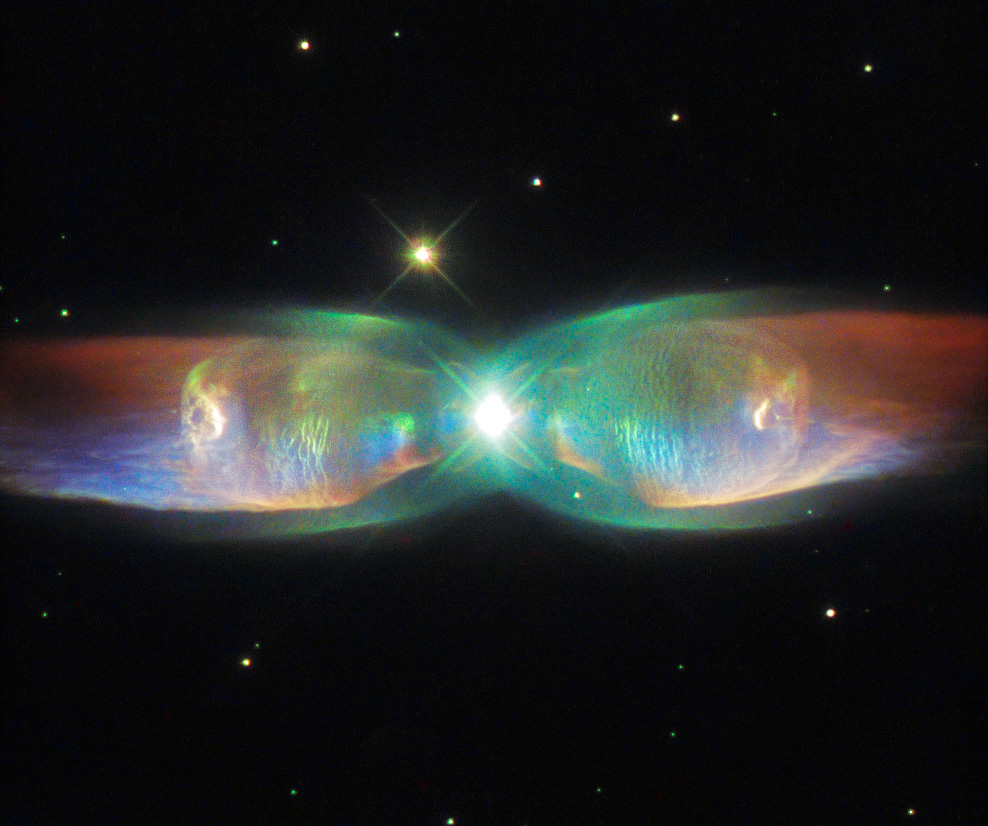Butterfly Dream
ω
I had a dream that I was a butterfly
winged iridescent; my life would flutter by
as I was dreaming a dream of a dream of
my own lepidopteron being above.
Hither and thither I flightily flitted,
or so it seemed, as illusion befitted,
with troubles, eidolons, and nebulous fears.
And thus it continued for one hundred years.
In the Nymphalidae family was I,
akin to the nebula high in the sky
with beauty Cithaerial shimmering bright
in colors that cover the spectrum of light.
Knots and shells detailed in this Hubble capture
glow in light show that can bring about rapture,
cause soulful poets to sing about gladly
(seeing a butterfly wing about madly)
or brood over sadly with soft doleful sighs
the ultimate stages before its demise.
Stargazers perceive it with scientists’ eyes
and give facts and figures astronomer-wise.
The lobes of Twin Jet PN M Two Dash Nine
expand ever outward in pinion design
from central star system, in gaseous streams
of splendorous rainbows pellucid in gleams.
The binary stars at the nebula’s heart
go round one another in luminous art,
spending a century in this rotation,
and form the wings through their stellar gyration.
But let us return to the classical theme
of the Chinese philosopher’s famous dream
(which these rhyming stanzas have sought to extol),
where I found myself playing a starring role.
Diaphanous butterfly wings had I then
in the long-lived dream that I dreamed ten by ten
decades lastingly onward in cosmic time,
as did Sleeping Beauty in legend sublime.
Yet when I awakened, no alae had I.
No longer was I slender winged butterfly,
but veritably was a human once more,
with life to engage in, encounter, explore,
or just suffer through in a sentient state.
How would I create my tellurian fate?
Still I wondered if this was ‘reality’.
Could I be a butterfly dreaming of me?
To die, perchance dream; ay, indeed that’s the rub
that makes us endure the heartache and hubbub.
For death claims all beings as part of its sum.
And in sleep of death, who knows what dreams may come?
~ Harley White
* * * * * * * * * *
Inspiration for the poem came from the article, The wings of the butterfly ~ New Hubble image of the Twin Jet Nebula, of August 25, 2015, on the Hubble Space Telescope Org website.
Article with video ~ The wings of the Twin Jet Nebula...
Further inspiration derives from the following butterfly dream mentioned in philosophic and Buddhist writings: During the Chou Dynasty 370 B.C., Chuang Tzŭ (or Zhuang Zhou) once dreamed he was a butterfly. When he awoke after a period of a hundred years, he no longer knew if he was a butterfly dreaming he was a man, or a man who had dreamed he was a butterfly.
This dream is referred to in the writing by Nichiren Daishōnin, which Martin Bradley has titled, A Collation of the Layers of the Various Teachings of all the Buddhas of the Past, Present and Future as to Which Specific Doctrines are to be Discarded or Established.
The shimmering colors visible in this NASA/ESA Hubble Space Telescope image show off the remarkable complexity of the Twin Jet Nebula (PN M2-9). The new image highlights the nebula’s shells and its knots of expanding gas in striking detail. Two iridescent lobes of material stretch outwards from a central star system. Within these lobes two huge jets of gas are streaming from the star system at speeds in excess of one million kilometers per hour.

Credit: ESA/Hubble & NASA
| Table of Contents |
|
